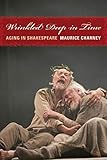Wrinkled Deep in Time : Aging in Shakespeare / Maurice Charney.
Material type: TextPublisher: New York, NY : Columbia University Press, [2009]Copyright date: ©2009Description: 1 online resource (192 p.)Content type:
TextPublisher: New York, NY : Columbia University Press, [2009]Copyright date: ©2009Description: 1 online resource (192 p.)Content type: - 9780231142304
- 9780231520898
- 822.33
- PR3069.A38 C53 2009
- online - DeGruyter
- Issued also in print.
| Item type | Current library | Call number | URL | Status | Notes | Barcode | |
|---|---|---|---|---|---|---|---|
 eBook
eBook
|
Biblioteca "Angelicum" Pont. Univ. S.Tommaso d'Aquino Nuvola online | online - DeGruyter (Browse shelf(Opens below)) | Online access | Not for loan (Accesso limitato) | Accesso per gli utenti autorizzati / Access for authorized users | (dgr)9780231520898 |
Frontmatter -- Contents -- Acknowledgments -- Introduction -- 1. King Lear, Titus Andronicus, and Cymbeline -- 2. The Aging Pro cess, with Special Reference to Macbeth -- 3. Time the Destroyer in the Sonnets and The Rape of Lucrece -- 4. "Heavy" Fathers -- 5. Politic Old Men: Polonius, Nestor, and Menenius -- 6. Wise Old Men -- 7. Falstaff -- 8. Jealous Old Men: Othello and Leontes -- 9. Old Warriors and Statesmen in the En glish History Plays -- 10. Fatal Attraction: Antony and Cleopatra -- 11. Powerful Older Women -- 12. Loving Older Women -- 13. Lusty Older Women -- Conclusion -- Notes -- Index
restricted access online access with authorization star
http://purl.org/coar/access_right/c_16ec
Shakespeare was acutely aware of our intimate struggles with aging. His dramatic characters either prosper or suffer according to their relationship with maturity, and his sonnets eloquently explore time's ravaging effects. "Wrinkled deep in time" is how the queen describes herself in Antony and Cleopatra, and at the end of King Lear, there is a tragic sense that both the king and Gloucester have acquired a wisdom they otherwise lacked at the beginning of the play. Even Juliet matures considerably before she drinks Friar Lawrence's potion, and Macbeth and his wife prematurely grow old from their murderous schemes.Drawing on historical documents and the dramatist's own complex depictions, Maurice Charney conducts an original investigation into patterns of aging in Shakespeare, exploring the fulfillment or distress of Shakespeare's characters in combination with their mental and physical decline. Comparing the characterizations of elderly kings and queens, older lovers, patriarchal men, matriarchal women, and the senexthe stereotypical old man of Roman comedywith the history of life expectancy in Shakespeare's England, Charney uncovers similarities and differences between our contemporary attitudes toward aging and aging as it was understood more than four hundred years ago. From this dynamic examination, a new perspective on Shakespeare emerges, one that celebrates and deepens our knowledge of his subtler themes and characters.
Issued also in print.
Mode of access: Internet via World Wide Web.
In English.
Description based on online resource; title from PDF title page (publisher's Web site, viewed 02. Mrz 2022)


